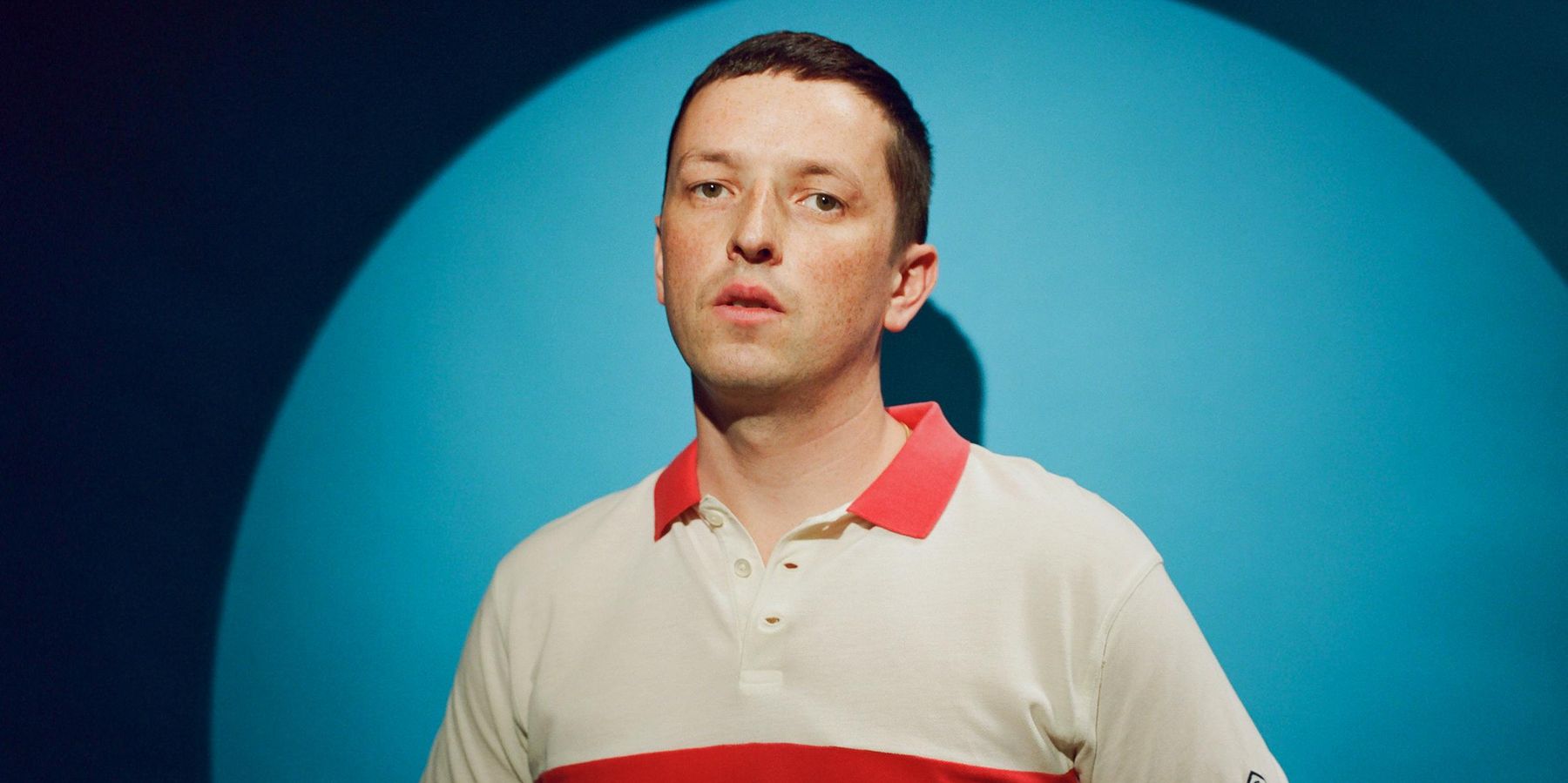It's been a decade since DJ and producer Orlando Higginbottom, better known by his stage name Totally Enormous Extinct Dinosaurs, dropped his debut album Trouble. Incorporating deep house, indie dance, techno and post-EDM at a time when the EDM scene was arguably at its peak, the album was a strong first showing for the relatively new artist, showing a promising pop ear with a firm grasp of club-ready beats. Higginbottom had the dance world eating out of the palm of his hand, drawing immense critical praise for Trouble and getting tapped to do remixes for everyone from Disclosure to Sky Ferreira.
Then everything sort of fizzled out. Totally Enormous Extinct Dinosaurs would go on to release a handful of singles, a smattering of remixes and a few collaborations with artists such as The Knocks, Porter Robinson and Bonobo (the last of which ended up with a Grammy nomination) over the ensuing years. Questions around the much-anticipated follow-up to Trouble fell by the wayside as the music industry shifted towards streaming; putting out full albums became less of a concern, with execs content to churn out single after single if doing so kept numbers up.
Some artists thrived under this industry shift, finally free from the album cycle slog, while others still stuck to the medium. Higginbottom could have gone either route, but choosing to follow through on a sophomore record a decade later makes the record all the more satisfying.
When the Lights Go, Totally Enormous Extinct Dinosaurs' latest album, is a sprawling 17-track epic that sees the artist present some of his most refined material to date. Crammed full of tender vulnerability and dominated by all sorts of musings about the infinitely complex idea of love, the album leans even more into Higginbottom's singer-songwriter side, striking a smoother blend between pop and dance. Assembled from a collection of songs written throughout the past decade, When the Lights Go is a more mature Totally Enormous Extinct Dinosaurs. The edges are polished; the ideas have more room to breathe; songs grow organically, as exemplified by the synth warble in "Blood in the Snow" that opens up into a muted melancholy plod.
From the exuberant trolley that is opener "Crosswalk" to the buoyant Cut Copy synth-pop of the title track "When the Lights Go," the record is packed with ecstatic-bordering-on-abrasive highs while making sure to balance the euphoria out with sobering lows. At its most upbeat, tracks like "Story" or "Never Seen You Dance" convey a metropolitan pop-timism akin to the romanticization of city life in Disney's Oliver & Company, injecting urgency and excitement about discovering something new. The record's only true full-on club track, "Sound & Rhythm," chugs intrepidly on, with its clanging melody and churning beat driving through a swirling cloud of voices.
Some of Higginbottom's most salient moments come when the disco ball slows to an introspective pace. Whether it be the drunken, climatic swells towards the back half of "The Sleeper" or the gut-wrenching sincerity of album centerpiece "Be With You," Totally Enormous Extinct Dinosaurs has the propensity to offer his insecurities and anxieties up on a silver platter to listeners and gild them with earnest and heartfelt sentiment. While When the Lights Go's highs are exhilarating and euphoric, the record's more muted moments hit on an intimate scale, with a pensive patter of songs including "Treason" and the late-night lounge vibes of "Blue is the Colour."
To its credit, When the Lights Go sounds like an album that took a decade to make. Packed full of nuance and detail, the record reflects a natural musical evolution for Totally Enormous Extinct Dinosaurs as an artist and a much more world-weary Higginbottom as a person. It's innately human to love and to want to be loved, and When the Lights Go finds solace and comfort in the emotion's familiarity. Even in the face of heartache and self-doubt, the refuge of a solid dance record can be just the soothing balm that makes it all feel worthwhile. Ten years in the making, When the Lights Go was worth the wait.
Ahead of the North American leg of his tour, PAPER caught up with Totally Enormous Extinct Dinosaurs to chat about his latest album, the realities of touring in a post-pandemic world and what he sees in his future.

Photography: Dan Wilton
This record has obviously been a long time in the works. What is it like now that it's finally out in the world?
It's a nice feeling. It's very much like sort of letting go of something. The weight of making it and preparing it and trying to get it into existence is way greater than its eventual weight as a piece of art in the world. I'm never gonna get back the amount of energy I put into making it from it being out there, but that's also a lovely feeling. I had to go through all that bullshit for this to exist, and it's sort of wonderfully meaningless. It's kind of nice. It makes me want to make more music. The sort of absurdity of the process I find quite freeing basically.
Why the long gap between records?
Obviously, there isn’t a sort of silver bullet answer to that. There's a number of things that happened, so I'll try and keep it not too awfully long. At the beginning, there was putting out my first album, which was really good and really strange. Being fairly young and not really knowing what I was going through, or how successful it was or not successful it was. I got to take it around the world and people liked it, but I didn't know what that meant. I just thought, “I need to try harder. It needs to be bigger. This isn't big enough yet. I need to have more songs on the radio. I'm not headlining the festivals. I'm playing second on the bill.” I think that was the culture of the music industry mixed with me not knowing how to congratulate myself at all. I basically had a very early burnout way too early in my career. I was like, “I'm gonna take two years off touring the live show. I'm gonna DJ and make this next record.” Then I moved to America and got pretty lost in something a bit like depression and needed to do some growing up. I was making music the whole time but really couldn't see a way to release music in the industry with the mechanisms that were in front of me.
Everything seemed to be a trap. All the deals that were being put in front of me, all the people that wanted to work with me, it all felt exploitative. It all felt like it was short-term for them in a good way and short-term for me in a bad way. That just seemed to be everything that was in front of me. I was like, “I can't. This doesn't make any sense, doesn't feel good.” But I was still writing music.
Then, around 2018, I started getting my shit back together, self-releasing and rebuilding and experimenting with how to structure my business. I think that one of the main things here is the first time around, it was very much the traditional music industry that we've grown up with. Now, I understand that I had to be a business person as well as an artist for this to actually be a sustainable career and job. I wish I could just have a conversation that's like, “Yeah, the lyrics are about this.” But that's not what being a musician means now. It’s also how we operate within a fairly toxic and exploitative business. That's just as much a part of the conversation, unfortunately.
How have you evolved musically?
I got more and more into the idea of things being song-led and less sort of dance floor. That was really important to me, as was finding a way to do more music and fewer beats, as it were. Theoretically, if you are locking your song to a two-bar or a one-bar loop with a four-four kick drum, there's only so far you can take it musically. Obviously, you can make incredible music, and people have made incredible music like that. But you're restricting yourself to house and techno music parameters. I didn't want to be restricted by that. Playing with styles and not really worrying too much about the marketing aspect of my project and doing a ballad, some R&B.
I think that my production has improved. I think my musical ideas are similar. I can hear that my chords and melodies are very much the same as they've always been. I'm still attracted to the same harmonic language, but I'm looking for different ways to present it.
Would you say that “Leave a Light On” and “Don't You Forget About Me'' were pivotal points for your shift into that?
Yeah, it's annoying because those songs, I put them out in 2018, but they were done in 2014. I was ready to do that record then, and do a whole album of that stuff, and I just couldn't figure it out. I only really have myself to blame there. I didn't have the guts to self-release. I hated the look of the record deals. It stumped me. Creatively, I had a spine, but business-wise I didn't.
I'm very, very proud of those two songs. That’s some of the best stuff I've made, and that was supposed to be the beginning of the second album. I think there was another second album in 2016 that was a bit more post-EDM sound. And then we ended up with whatever this one is in 2022.
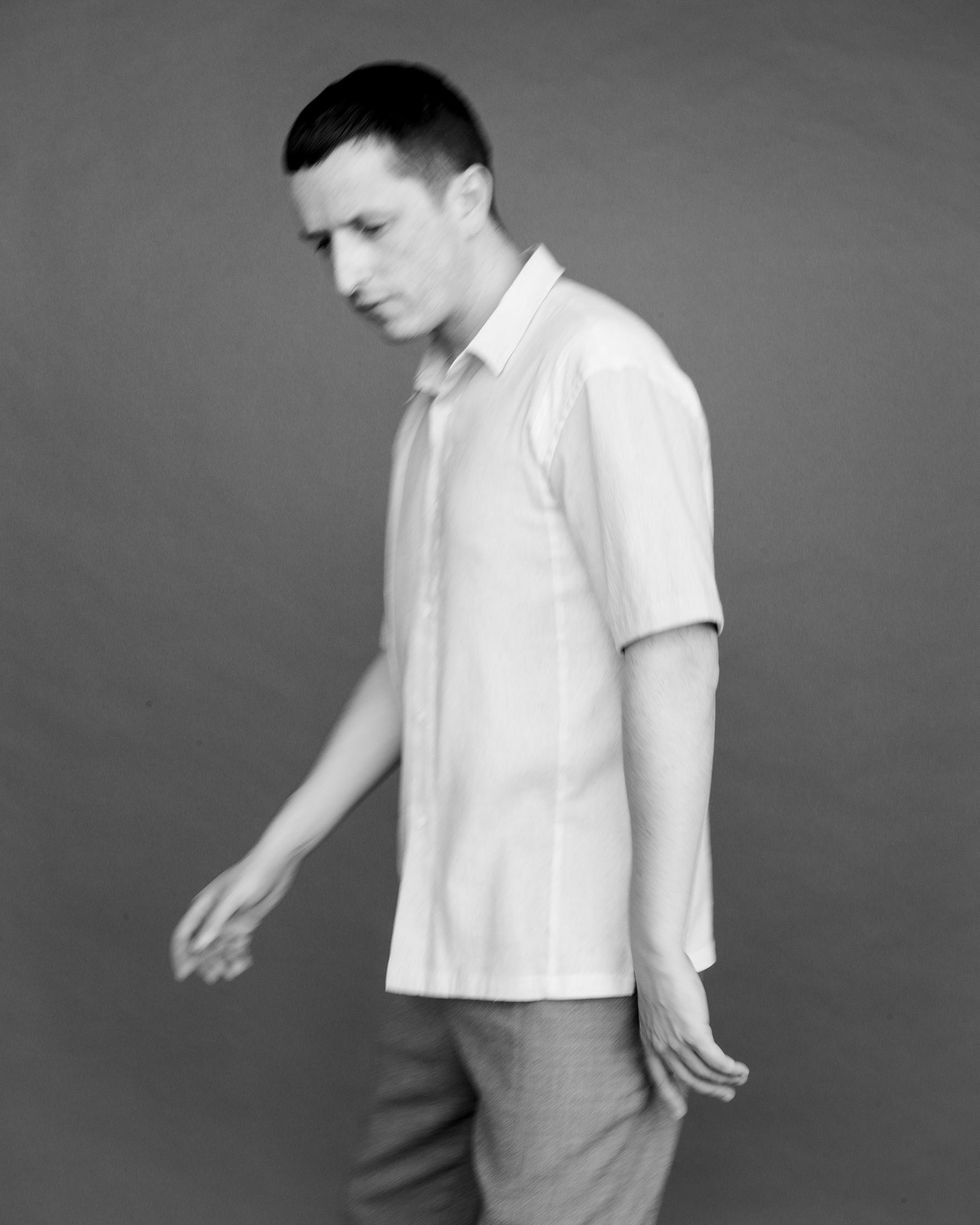
Photography: Jade Mainade
How did you find a balance between, as you mentioned, the more club-primed fare on the record and the more pop-leaning songs?
On this album, there's only really one practical club record, which is “Sound & Rhythm.” Honestly, I tried not to balance it. I tried not to think about it and let that be too much of a point that I needed to address. The more important thing to me was the actual mood and concept of the record — that I stayed within that and it wasn't just a collection of the most fun things I've made over the last ten years but more of an actual feeling. There is a lot of material in my studio that is much more clubby, but it didn't really fit on this record. It was just more important to me to make it an interesting record than, and I don't mean that cynically, but to make sure that there's a few bangers on there.
What were some of the ideas or concepts you were working with on the record?
It's hard to talk about this without sort of belittling the themes, but I think there's two pictures. It's finding and losing love in the atmosphere of an apocalyptic world, with the feelings of what it was like living in Trump's America, what it was like living through the pandemic, what it's like now being so hyperaware of our climate change and that chaos is coming. At the same time, while we're experiencing these big global things, being like, “I want to be in love and crush on someone and have somebody to hold.” That’s one side of it.
Parallel to that is a sort of hedonist version of that, about partying basically and wanting to get your fix but knowing that it's doomed, knowing that it's bad. The two poetically aligned lyrically often for me. So, yes, it's a sad record. It's a doomy record for me. I don't know how other people take it, but that's how I ended up focusing on those tracks because I was like, “These fit in as well. These give me the same feeling. They feel related and it's a dark thing.”
That's a very human want in the face of uncontrollable struggle and strife: to just want escape. Finding comfort, love and interpersonal relationships in this utopic vision of partying. "Escapism" gets thrown around a lot, but it feels a little reductionist.
Absolutely. That's very well-put. Thank you for being more eloquent than I am. I’m glad you’re writing this piece.
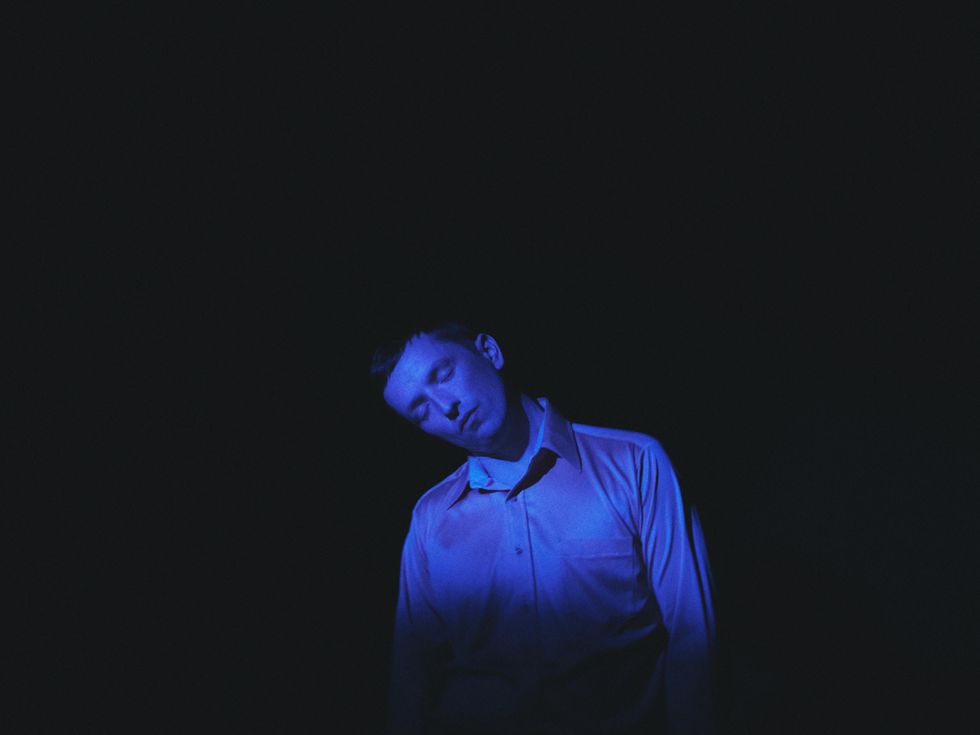
Photography: Alexandra Waespi
What do you hope people take away from the record?
I feel quite strongly that that's not my business. It’s not the only way I can operate, but it feels like the sensible way to operate once a record is out. It's not mine to interpret, it becomes other peoples’, hopefully. They put their meaning on it. Having said that, I hope that, as a musician, it's inspiring to other musicians. I hope that other musicians hear it, better musicians than me, and make more important records than I could make. I don't think I am ever going to make world-changing music, but I do think that you can be part of opening doors for other people and creating space for other creatives to go and do really important shit. My dream with putting out music is to nudge open a bit more creative space for somebody else to step into. I love that.
I want to kind of focus on two of my favorite tracks off of the record, starting with “Crosswalk.” It's this big opener. I'd love to dive into how that particular song came about and why you put it there.
Well, I have a piece of paper on my studio wall and on it is, in big letters, ”Be a wally.” It’s my reminder to sometimes do the really, really simple thing, take the obvious choice. Don't overthink it. I think the day that I wrote that down, I wrote the bass line for “Crosswalk.” I was like, “What's the simplest bass line I can come up with? Something that I would have written on a piano when I was 10 years old, something that I'd avoid now because it seems not intelligent enough.” Then I wrote this big distorted synthy riff that's in the chorus and just started building from there. That's how it appeared as an instrumental.
I had naive fun building this world of gambling metaphors, you know, I’ve spent a few silly nights in Vegas, and putting myself in that headspace. I really wanted it to be something that felt widescreen. I've never really listened to a U2 record in my life, but I was thinking about what I thought a U2 record would sound like. The outro of that song, I was like, “I wonder if this is what U2 sounds like.” There were other records on the album that I was thinking about, for example, “What does a Savage Garden record sound like? I want this to sound like a Savage Garden record, but I only know one Savage Garden record." It’s nice to imagine someone's work and try to pretend to make it.
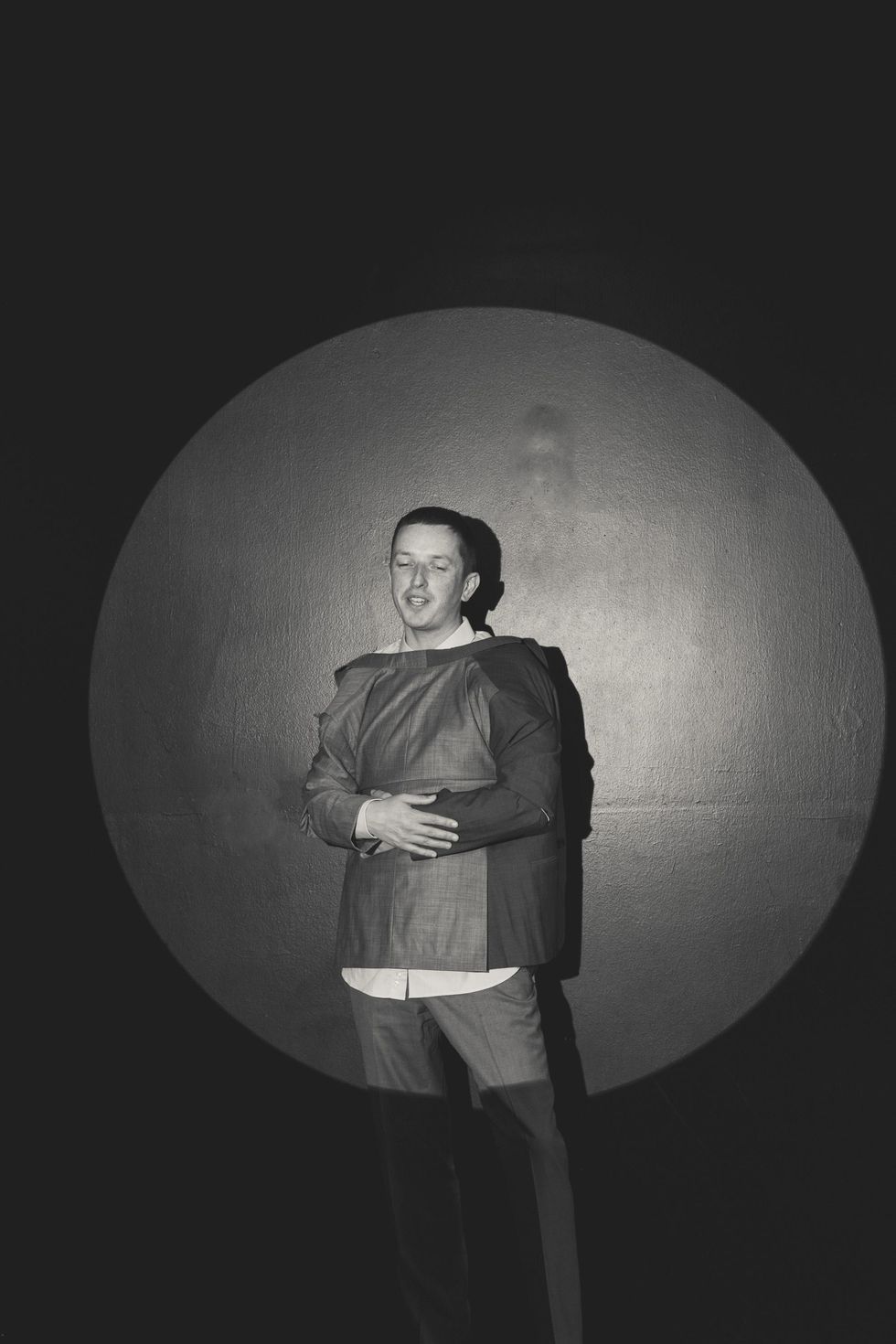
Photography: Jade Mainade
Song-writing fanfiction.
Yeah, yeah! It takes you somewhere, right? It's an exercise. So, “Crosswalk” was definitely a record that when it was done or when it started to appear as finished, I was like, “Okay, this is what this album is. This is pivotal and a cornerstone of this album's sound.”
“Be With You” is another stand-out coming towards the latter half of the record. It's a nice, still-ish moment.
Did you like that track?
Yeah.
Okay, good.
Quite a bop.
Really puzzled as to whether people get that song. It's such a weird time to release music. It has been for the last few years. I think people sort of fell into a trap of believing social media is a measure of whether people are enjoying something or not, and it's bullshit. Thirty people will comment on your song and 3 million people will listen to it. Whose opinion are you trying to read here? It's just so hard to gauge whether something resonates or not. My friend Ben sent me a demo that he'd made with the vocal sample at the beginning of the track, the hook, and a completely different beat and chords and everything. He was like, “Hey, can you help me with this?” And I was like, “Yeah, sure. Send it over. I'll play around.” I started writing the chords and the progression under that hook, and I called him up and asked, “Hey, man. Can I have this please? Can I write on this and turn it into something — with you — but I really want to play with this idea.” He very kindly was like, “Yeah, of course.”
I wanted to make something that I wanted to make, but I also wanted to respect the person and the vision that put the initial idea into my hands. So there were two creative forces in me going forward with that one. It felt like a really big risk, the emotional sentiment of the song is not very common in electronic music. It's very: “I fucking love you and being with you is just the best shit ever,” and that's not very commonly expressed.
I played demos of it to Four Tet. He was like, “just turn up your vocals.” He sent me some Serge [Gainsbourg] and said, “listen to these records.” I was like, “God, I don’t like Serge Gainsbourg. He’s a pervert.” But I listened to these Serge Gainsbourg records, and I got what he was saying. He was like, “Just listen to how loud Serge’s voice is. It’s kind of obnoxious. It’s cool,” and I was like, “Okay, fuck it.” If I'm going to put up this very poppy song, I'm going to take my vocal and push it as loud as I’ve ever pushed it.
That excites me because it scares the shit out of me. There could have been a mix of that song that's classic pop, sweet and sort of smooth. Instead, my vocal takes it into a slightly uncomfortable place, and I think that makes it interesting. Yeah, I love that song, it's one of the ones where I think this might have its own life in two years. It’ll become something else, separate from this record. I hope.
What does the future look like for you at the moment?
Oh, it's weird. I would really like to be making the next record right now. I think that's because I'm excited about making music but also because touring is a fool's game right now. I feel quite conflicted about that because I really do want to complete this circle. I really do want to go back out there on the road and perform this album and the previous work and it's obviously important for my career. But I think I'm gonna do three months of work and put myself in debt.
It's not possible to take a live show on the road right now and make money, and that was fine in my 20s. The thing is, in my 20s, I did make money out of it. It was a different economy, and it did pay me. I took six, seven people on the road with me for shows, I could do confetti, balloon drops, film stuff. Now, I'll be playing the same venues, the ticket prices are the same, I'm taking two people on the road with me and I’m gonna lose money. I don't know if that feels sensible. Obviously, we love this shit, we love music, and we love the whole community. But I'm battling with that. That's a tricky situation.
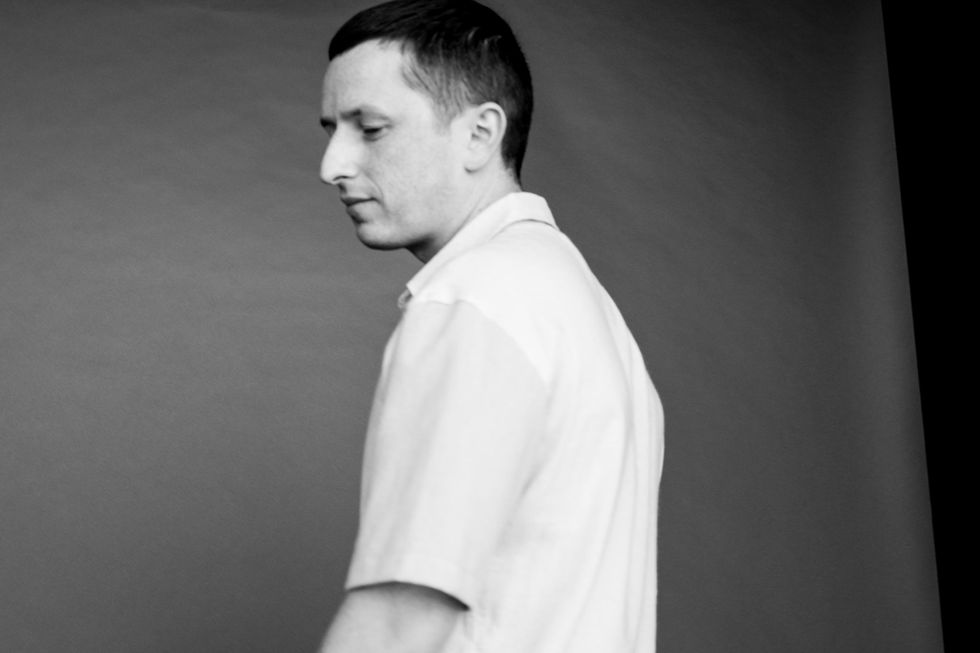
Photography: Jade Mainade
You're definitely not alone. Everybody rushed back to doing it once they could, but there's not enough to go around.
The really brutal part of it is that I'll speak to friends who are one rung up the ladder from me, ten rungs up the ladder from me, hyper-successful people selling out massive venues in Los Angeles, London, Berlin, everywhere, and they're like, “Yeah, it's coming in at a 100-grand loss, this tour.” So, here I am, doing my return to live tour. It's not a big deal, a bunch of bite-sized dates, but I'm a professional musician. It's my job. It's not a passion project in the same way it was when I was a kid. There has to be a long-term result that you get from your investments. It'd be one thing if I was like, “Okay, this year is going to be tricky, but next year, I'll make money and I'll be able to pay it back. I can do my thing,” but I don't know that that's guaranteed. I'm not alone, but I wish I was alone. I wish that it was just something that I hadn't figured out, and I was adding a zero somewhere I didn't need to add a zero.
The other thing to add is I am very happy in the studio right now. This work is really gratifying for me and I get paid properly for it. I see it as just as much of an artistic statement as releasing my original music. I get just as much satisfaction from it, so I could do that instead of going on the road. I'm sort of like, “Well, I could do that and I could get paid and I could be satisfied and be healthy and not get COVID again, and blah, blah, blah, or I can go out on the road, get sick, disappoint some fans.” I don't know, but it's a bit of a battle in my head right now.
Before we go, was there anything else you wanted to touch on?
We've touched on it, but I think one of the reasons that I'm proud of doing this the way I've done it is that I want to show people in my community that you can self-release records and get some nice press and get on some Spotify playlists. You can own your shit and get the same results that you get if you signed it away to a record label. I really want people to know that because this touring situation is bad. Imagine if you're an artist who is signed to a major deal and they don't see any money for royalties at all. There's no income. If the tour isn’t making money, and the record isn’t making money, there's nothing. This record will make me some money. I'm going to have income from the music, so I'd like people to know that it works. Self-releasing works, and they should do it.
Photography: Jade Mainade
- Let Porter Robinson 'Nurture' You ›
- Totally Enormous Extinct Dinosaurs Wants to See You Dance ›
- Totally Enormous Extinct Dinosaurs' New EP Is for the Birds ›
